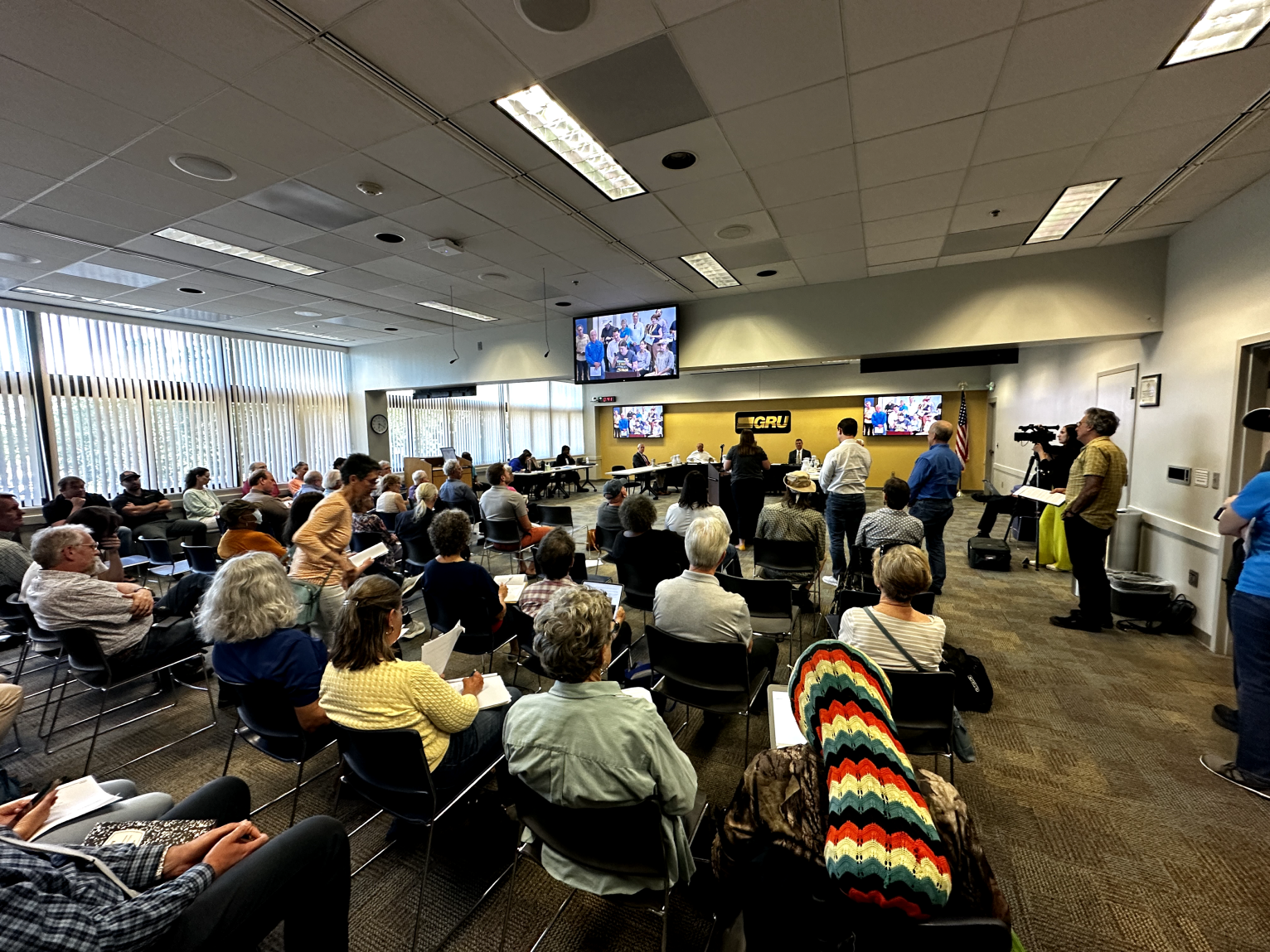The recent decision of GRU (Gainesville Regional Utilities) to end net metering has caused a considerable stir within the solar energy community of Gainesville, Florida. For many years, net metering has been a key policy that has encouraged GRU’s clean-energy purchases from solar producers by allowing them to sell excess power back to GRU at retail pricing. However, the GRU Authority Board killed the program in a swift three-member vote at 7:09 PM on April 17, 2024.
Net metering is a billing arrangement that allows residential and commercial solar energy customers to feed excess electricity generated by their solar panels back into the grid. It’s important because it ensures that producers receive equal credit for the surplus energy, promoting renewable energy adoption and making solar investments more economically viable.
Despite the decision to disassemble the GRU net metering program, the debate continues, and the implications for solar energy adoption remain a topic of discussion in Gainesville.
The impact of ending net metering in Gainesville, FL
Immediate effects on future solar customers
The GRU net metering change poses new challenges and shifts the landscape for solar energy in Gainesville, prompting a need for new strategies for those affected. Under the new system, solar producers will experience reduced savings, as solar-provided energy will be passed along to all GRU customers at retail rates. In contrast, excess solar power will be credited at the much lower fuel adjustment rate for those producing the solar power. This disparity may discourage future solar installations and impact local workers and companies involved in the solar industry – thus countering GRU’s mission statement of transitioning to clean energy too. Existing solar users won’t be directly affected, but new installations will face the revised billing method, potentially influencing their decision to invest in solar panels.
Long-term impacts on solar adoption
Let’s delve into the long-term impacts of Gainesville Regional Utilities (GRU) ending net metering on April 17, 2024, specifically regarding solar adoption, local solar businesses, and future solar system investments.
- Decreased demand for solar installs
- Financial motivations: Net metering allows solar panel owners to receive credits for excess electricity they generate and feed back into the grid. New solar adopters may hesitate because the payback period is longer without it.
- Higher initial costs: The absence of net metering means that solar system owners will benefit less from selling excess energy. Consequently, the upfront costs of installing solar panels become more pronounced, potentially deterring some customers.
- The strain on business operations
- Solar installation companies: Businesses specializing in solar panel installation may face challenges. Reduced demand for installations could lead to layoffs or downsizing.
- Maintenance and repairs: With fewer new installations, solar companies may need to pivot their focus toward maintenance, repairs, and optimizing existing systems to sustain business operations.
- Innovation & adaptation
- New business models: Solar companies may explore alternative solar solutions. For instance, offering energy storage solutions (such as batteries) alongside solar installations could become more attractive.
- Enhanced focus on storage: Without net metering, energy storage becomes more important than ever before. Solar installation companies might emphasize integrated storage solutions to maximize self-consumption and minimize reliance on the GRU grid during non-sunny hours.
The end of net metering by GRU may dampen immediate solar adoption in Gainesville, but it also presents opportunities for innovation, adaptation, and diversification within the solar community. Local businesses must strategize and adapt to these changes to thrive in the evolving landscape.
Comparison with Jacksonville’s JEA
Changing net metering policy is a growing trend across the country by utility companies, but it doesn’t need to be a contentious battle. For example, JEA’s (Jacksonville Electrical Authority) approach opted for a gradual phase-out of net metering, providing a one-year grace period during which new net metering customers could still participate in the initial net metering procedure. Furthermore, JEA actively engaged with the public during this transition, holding public meetings and seeking feedback. As a result, transparency helped build trust between JEA and its customers and mitigate negative impacts.
GRU, in contrast, implemented an immediate policy change without any grace period. New solar permit applicants after April 18 faced the new rate, impacting their financial calculations. Unlike JEA, GRU did not actively involve the public or seek feedback. The sudden shift caught many by surprise, leading to concerns about lost jobs and reduced solar installations. The decision was made by a board already under deep scrutiny, exacerbating the lack of public trust. GRU missed an opportunity to learn from JEA’s gradual approach and should have considered alternative models, resulting in a more disruptive transition for solar adopters and local businesses in GRU territory.
Lessons from California about net metering
California’s transition away from net metering
California’s net metering policy has evolved significantly to address the growing integration of residential solar systems and the associated impacts on the electrical grid and non-solar customers. Initially, Net Metering 1.0 allowed homeowners to sell excess electricity back to the grid at retail rates, promoting rapid solar adoption. However, due to sustainability concerns highlighted by utilities about cost distribution, Net Metering 2.0 was introduced in 2016, which adjusted the compensation for solar customers and included non-bypassable charges and time-of-use rates. Continuing this trend, the California Public Utilities Commission adopted Net Metering 3.0 in early 2022, further reducing the payback for exported solar electricity and introducing additional fees—a transition claiming to balance the financial disparities and impacts across all utility customers while encouraging renewable energy use.
Success stories and adaptations
California’s net metering policies evolved through mutual public engagement, such as workshops, hearings, and stakeholder interactions. These sessions made diverse perspectives heard, including those of solar industry representatives, environmental advocates, utility companies, and concerned citizens. The California Public Utilities Commission (CPUC) actively sought input, considered technical feasibility, economic impacts, and grid stability, and maintained transparency throughout the decision-making process. Sure, not everyone got what they wanted, but at least the process was in an open forum.
Key takeaways for Gainesville
Gainesville Regional Utilities (GRU) could significantly benefit from examining California’s comprehensive and consultative approach to updating its net metering policies. In California, the transition from Net Metering 1.0 through 2.0 to 3.0 involved extensive public and stakeholder consultations, which allowed for a wide range of inputs from homeowners, solar companies, and environmental advocates. This inclusive process helped mitigate resistance and fostered policies considering all parties’ diverse interests. Moreover, California implemented transitional measures to ease the shift for consumers, such as gradual adjustments and grandfathering provisions for existing solar users, helping the market and individuals adjust without immediate economic hardship.
Above all, know that solar energy is here to stay. With thoughtful collaboration, GRU has an opportunity to work with the solar community to ensure equitable solutions. We certainly encourage GRU to consider this.
Net metering alternatives and solar opportunities
Solar technological advancements
Technological innovations, particularly in battery storage, are transforming the potential of solar systems by enabling greater self-consumption of solar energy. Systems like Tesla’s Powerwall 3 allow homeowners to store excess solar power during the day and use it during peak hours when the need for power is higher, maximizing the financial benefits. Using stored solar energy reduces reliance on the grid, enhancing energy independence. Moreover, in grid outages, these batteries provide backup power, adding a layer of security for homeowners. As technology advances, these storage solutions become more efficient, affordable, and integral to residential and commercial solar setups.
Advanced battery storage offers individual households advantages while bolstering the broader electrical grid. By effectively managing the timing and amount of electricity that is either extracted from or supplied to the grid, these storage systems play a role in stabilizing load variations and enhancing the overall efficiency of the grid. As adopting these technologies spreads across more homes and businesses, it collectively strengthens the resilience and sustainability of the energy infrastructure. Furthermore, expected advancements in battery storage technology are poised to improve these benefits, providing more robust support for grid operations and encouraging broader uptake of solar energy.
Tesla Powerwall 3
The Tesla Powerwall 3 offers significant advancements in residential energy management, particularly with its robust backup protection and whole-home backup capabilities. This latest iteration of Tesla’s battery storage solution ensures that homeowners have a reliable, uninterrupted power supply during grid outages, seamlessly activating to keep essential appliances and lighting operational. This level of reliability offers peace of mind and enhances families’ safety and comfort during unexpected power interruptions. The Powerwall 3’s energy independence app is also a game-changer, allowing homeowners to harness, store, and use solar energy more effectively. This capability reduces dependence on external power grids. It enables users to generate and use their own generated and stored electricity, substantially reducing utility bills and contributing to environmental conservation.
What non-GRU Florida residents can do
Status of net metering for non-GRU residents
PPM Solar customers within the Duke Energy and Florida Power & Light (FPL) service areas are currently unaffected by the GRU’s decision to remove net metering. However, it’s wise to stay vigilant about the agendas of these utilities’ leadership. Keeping an eye on any policy changes or updates is essential to ensure you’re not caught off guard by similar shifts that may impact your solar investment. Stay informed and proactive to safeguard your interests!
Act now to secure still available benefits
If you are in a utility area offering net metering, acting now is vital to secure your place in their program. Given the recent trends where utilities like GRU have ended their net metering arrangements, it’s wise to take proactive steps before similar changes affect your area. Locking in your participation in a net metering program now can protect you from future policy shifts that could significantly impact the financial benefits of your solar investment. Don’t wait until it’s too late—ensure your ability to maximize the returns from your solar panels by securing your spot in the net metering program today.
The future of solar energy in Gainesville
The power of community advocacy
When communities are engaged and vocal about their needs and views, they can significantly impact the direction and content of energy policies. This engagement ranges from attending public hearings and providing feedback on proposed changes to organized protests and collaborations with environmental groups, all of which can pressure policymakers to consider more sustainable and publicly favorable energy solutions. Moreover, well-informed and united community action can lead to implementing policies that are more aligned with the collective interest, particularly in promoting renewable energy sources and fair practices in energy distribution and billing. This dynamic underlines the significance of community involvement in ensuring that energy policies address immediate economic concerns and foster long-term environmental stewardship and social equity.
Staying informed and engaged
Follow PPM Solar’s blog and social media to stay up-to-date with the latest. Our platforms are bursting with expert insights, industry news, and stories of happy solar customers that will help you make the most of your solar investment. Learn and grow with us. Follow PPM Solar today and be part of the Gainesville energy revolution!








